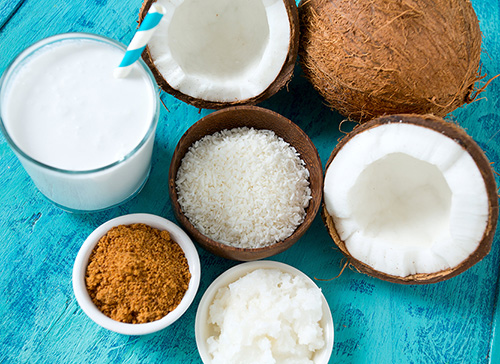
Coconut contains protein and fiber, as well as many essential minerals like:
- Iron
- Manganese
- Copper
- Magnesium
1 cup of fresh, shredded coconut contains the following nutrients:
- 283 calories
- 2.66 grams of protein
- 26.8 grams of fat
- 12.2 grams of carbohydrates
- 7.2 grams of fiber
- 4.98 grams of sugar
- 2.64 grams of vitamin C
While coconut is relatively low in sugar, it has a high fat content; 89% of the fat in one serving is saturated fat. But much of the fats are medium-chain fatty acids, which metabolize differently from long-chain fatty acids, like those found in beef and other animal fats. Medium-chain fatty acids have been associated with improvements in brain function and cholesterol levels.

However, it’s not clear if these benefits also extend to coconut oil. Ninety-two percent of the fat content in coconut oil is saturated fat and only a small percentage of that are true medium-chain triglycerides (medium-chain fatty acids made from coconut oil). The American Heart Association (AHA) and other groups warn against using coconut oil as your day-to-day cooking oil because of the high saturated fat content. One teaspoon of coconut oil has 12 grams of saturated fat and the daily total recommended by the AHA is 13 grams based on a 2,000 calorie diet. Plus, the oil has been shown to raise both “good” and “bad” cholesterol levels.
Coconut aminos
Coconut aminos sauce is made from the fermented sap (i.e., the flower nectar) of the coconut tree. The final product looks like soy sauce and can be used in the same way. It doesn’t have a coconut taste. If you want a flavoring sauce that’s gluten-free and soy-free, coconut aminos is a good alternative to soy sauce. It also has much less sodium and a somewhat sweeter taste than soy.
Coconut Health Benefits
Historically, people have used coconut as part of traditional medicine. The fruit is said to, among other things:
- Counteract some poisons
- Ease inflammation
- Kill bacteria
- Treat diarrhea
- Treat kidney diseases
- Reduce pain
- Treat menstrual issues
Researchers have found that coconut husk-fiber extracts reduced pain and inflammation in mice. They also found that coconut water showed antidiabetic effects in animal studies and reduced blood pressure in hypertensive rats. But it’s not clear if these benefits carry over to humans.

Scientists also found that coconut extracts, particularly from the husk, showed antimicrobial properties and were effective against various bacteria, fungi, and viruses in lab tests. Coconut endocarp and virgin coconut oil also have high antioxidant activity, which is good for resisting harmful molecules in the body.
Here are some proven health benefits of the fruit:
Improves your endurance. Coconut meat contains large amounts of medium-chain fatty acids (MCFAs), which are easier for the human body to digest than animal fats. These fats have been demonstrated to boost the endurance of trained athletes.
Gives you better oral health. The antimicrobial properties of coconut meat can be useful in preventing infections related to root canals and other teeth issues. Although eating the meat is not a substitute for proper dental hygiene, it can help kill some of the unwanted bacteria found in your mouth and protect your gums and teeth from infection or cavities.
Helps you lose weight. Regularly eating coconut meat might help with weight loss. The MCFAs widely found in the meat are associated with fat burning.
Replacement for IV fluids.Coconut water was used like this for a patient in the remote Solomon Islands in the South Pacific, as well for some patients during World War II and in developing countries with no ill effects. But it’s not an ideal fluid for rehydration as its sodium content is low.
Source
Medically Reviewed by Zilpah Sheikh, MD on January 30, 2024 Written by WebMD Editorial Contributor

